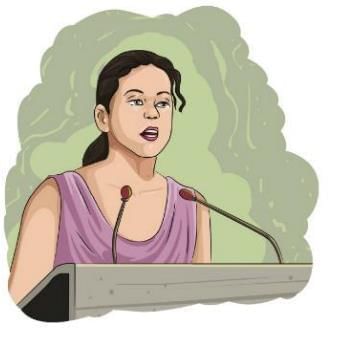I Am Here to Speak Chapter Notes | English Class 6 ICSE PDF Download
| Table of contents |

|
| Introduction |

|
| Key Points |

|
| Explanation |

|
| Message |

|
Introduction
This chapter features a powerful speech by Severn Suzuki, a twelve-year-old girl, given at a 1992 United Nations meeting in Brazil. She and her friends, part of the Environmental Children's Organization (ECO), raised funds to attend and urge adults to protect the environment. Severn addresses issues like pollution, dying animals, and poverty, pleading for change to secure a better future for kids. The chapter connects to a previous story where a boy saves a rare animal, starting with a question about kids feeling ignored when adults overlook wrongs.

Key Points
This story is about Severn Suzuki, a 12-year-old, who spoke at a UN meeting in 1992 for her group ECO.
- She and friends raised money to travel and ask adults to stop harming the earth.
- She speaks for future kids, hungry children, and animals losing their homes.
- Fears sun exposure due to sky damage and breathing polluted air.
- Fish near her home are sick; animals and plants disappear daily.
- Worries her kids won’t see wildlife or forests she dreams of.
- Adults don’t know how to fix sky holes, rivers, extinct animals, or forests.
- If they can’t fix it, they should stop causing harm.
- Everyone is part of one big family, including all people and creatures.
- Urges everyone to work together to save the earth.
- In Canada, people waste a lot; rich places don’t share with the poor.
- Met street kids in Brazil; one wanted to share food and care if rich.
- Questions why adults don’t follow lessons they teach kids, like sharing.
- Adults’ actions shape kids’ future; they must act, not just talk.
- Severn, born 1979, works to save nature and speaks worldwide.
Explanation
Severn Suzuki, a twelve-year-old from Canada, spoke at a big UN meeting in Brazil for her group ECO, which she and her friends started to help the environment. They worked hard to raise money and travel 5,000 miles to tell adults to change their harmful ways. Severn speaks openly, fighting for her future and those of all kids. She represents starving children whose cries for help are ignored and animals losing their homes. She is scared to go outside because the sky’s protective layer, called the ozone, has holes, and the air she breathes might have harmful chemicals. In her hometown, Vancouver, fish she used to catch with her dad now have diseases like cancer, and many animals and plants are disappearing forever every day.
Severn dreams of seeing vast herds of wild animals, green forests, and jungles full of birds and colorful insects, but she worries her own children might never see them. She asks if adults thought about these problems when they were young. Even though these issues are happening now, people act like there’s plenty of time and easy solutions. Severn admits she’s just a child without all the answers, but she points out that adults also don’t know how to fix big problems like the ozone holes, bringing fish back to lifeless rivers, saving extinct animals, or regrowing forests in desert areas. If adults can’t fix these, they should at least stop making things worse.

She reminds the audience—leaders, workers, reporters, or organizers—that they are also parents, siblings, or someone’s child. Everyone is part of one big family, including billions of people and millions of species, and borders on maps can’t change that. Severn, though young, calls for everyone to unite for one goal: saving the earth. She shares her anger and fear, especially about waste in her country, Canada, where people buy and throw away things endlessly. Rich countries don’t share with poor ones because they fear losing wealth, even though they have plenty, like food, water, homes, watches, bikes, and computers.
In Brazil, Severn met kids living on the streets. One child said if he were rich, he’d give food, clothes, medicine, homes, and love to other street kids. This made Severn think: a poor child wants to share, but rich people stay selfish. She reflects on how lucky she is, as she could have been born as a poor kid in Rio, a hungry child in Somalia, a war victim in the Middle East, or a beggar in India. She believes money spent on wars could instead fix the environment, end poverty, and make peace, creating a wonderful world.
At school, kids learn to respect others, solve problems, clean up, avoid harming living things, share, and not be greedy. But Severn wonders why adults don’t follow these rules they teach. She says these UN meetings are for kids’ futures, as adults decide the world they’ll grow up in. Parents should comfort kids, saying everything will be okay, but Severn feels they can’t say that now because kids might not be their priority. Her father taught her that actions matter more than words, and adults’ actions make her sad. She challenges them to show their love for kids through what they do. Severn, born in 1979, continues to work for nature, host TV shows, write books, and speak globally.
Message
The story teaches that adults must stop damaging the earth and care for kids’ futures. Everyone is one big family, so we must work together to fix pollution, save animals, and share with the poor. Kids learn to respect and share, but adults must do the same, matching their actions to their words for a better world.
New Words with Meanings
- Agenda: A reason or plan behind doing something.
- Ozone: A gas layer high in the sky that stops bad sun rays from reaching us.
- Salmon: A fish from the sea that goes up rivers to have babies.
- Delegate: A person sent to speak or act for others.
- Northern countries: Rich and grown-up nations in places like Europe and North America.
- Privileged: Having good things that most people do not get, often from money or place in society.
- Favela: A poor area in Brazil with simple houses and bad living.
- Treaty: An official deal between countries.
- Priority: Something that needs attention before other things.
|
38 docs|19 tests
|
FAQs on I Am Here to Speak Chapter Notes - English Class 6 ICSE
| 1. What are the key components of an insurance exam? |  |
| 2. How can I effectively prepare for my insurance exam? |  |
| 3. What types of questions can I expect on an insurance exam? |  |
| 4. Are there any common mistakes to avoid when taking an insurance exam? |  |
| 5. What is the importance of ethics in the insurance industry, as covered in the exam? |  |














